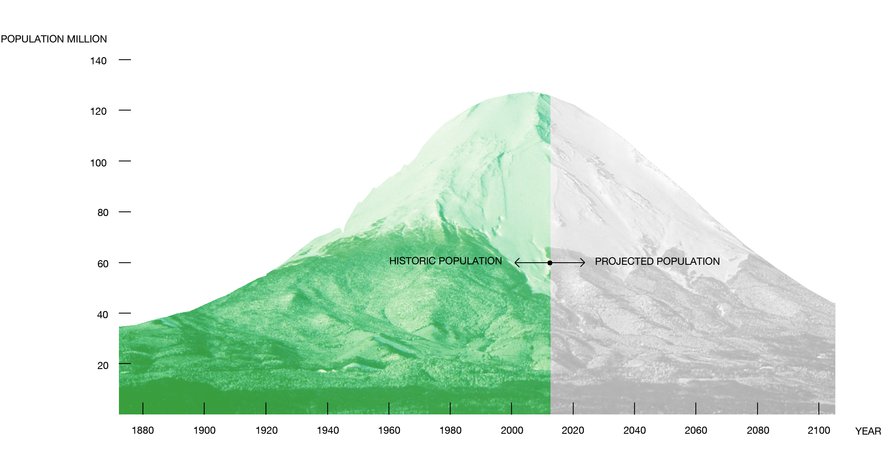Futurescape Tokyo is
a study in urban
fantasies and speculative
cartography. The project aims
to explore potential future
scenarios of the world's
largest megalopolis Tokyo,
which is expected to
shrink dramatically
during the next 86 years.
THE PROJECT
Futurescape Tokyo is a study in urban fantasies and speculative cartography. Initiated by Swedish journalist Anneli Enqvist and architect Maja Alton, the project aims to explore potential future scenarios of the world's largest megalopolis Tokyo, which is expected to shrink dramatically during the next ninety years.
THE FUTURE, REVISITED
In the 80s when we grew up, Tokyo was the symbol of future and modernity. With its neon lights, tiger economy and capsule houses, the city seemed like real-life science fiction. Then the bubble burst and paralyzed the economy for decades. It has not recovered since. The global capital has turned its gaze toward new favorite cities, and the fastest growing metropolitan areas are today situated in Africa, with names such as Lagos or Cairo. The global financial crisis, and the 2011 Triple Disaster with an earthquake followed by a tsunami and a nuclear meltdown, exacerbated the situation. One can almost believe that the world's largest mega-city left its future behind it.
In fact, the population of Tokyo will soon start to decline if the current trend continues. As the 35 million Tokyoites are getting older, birthrates are falling, and the immigration policies continue to be very restrictive, experts postulate that Greater Tokyo's population will be be cut in half by year 2100.

source: wikipedia
TRAUMAS AND NEW OPPORTUNITIES
Tokyo has been destroyed and rebuilt several times in history. Wars and natural disasters have shaped a city that has come to symbolize not only future, but also devastation. Tokyo's many traumas and the recurring destruction and rebirth, have inspired a considerable amount of urban visions throughout the years. From cinematic cyberpunk dystopias like Akira and Blade Runner, to more lifelike projects such as Kikutake Kiyonori's Oceanic City and Kenzo Tange's Tokyo Bay Plan. Some of the ideas have been realized in steel and concrete, while others have stayed on sketch paper, or in the cinemas.
While Tokyo’s still influential post-war metabolist movement created visions intended to tackle a city in a rapid economic and demographic growth, today's pressing issues are of a different kind. How will Japan’s weak economy, shrinking population and geographical vulnerability affect the physical shape of its capital city in the next century? Are there ways to make use of the situation to open up for new potential ways of thinking about urban development, possibly more sustainable ways? These questions are in the heart of this study.
APPROACH
Futurescape Tokyo is an interdisciplinary research project combining artistic research, speculative cartography and journalistic methods in order to explore possible urban futures in a post-expansive Tokyo. Through interviews and quick sketch studies with a number of Tokyoites – an architect, a sociologist, an ex-banker, a house wife, a social media engineer and a design philosopher – we are building a speculative atlas of Tokyo's possible urban landscape in year 2100, 86 years from now. The date is chosen to be too far away for anyone to be able to actually predict anything factive about the reality of Tokyo at the particular time; yet it is close enough to be directly related to the city where the project participants live and act today. This will hopefully open our minds to free speculative thinking around possible future scenarios.
In this way the project places itself in the intersection between the real and reasonable on the one hand, and the more tentative, unpredictable and amazing on the other. We believe that it is through playful sketching the most provocative ideas arise. The aim is to reach beyond the factual level of statistic bars, to add a higher degree of human imagination to the ongoing discussion on the future of Tokyo.